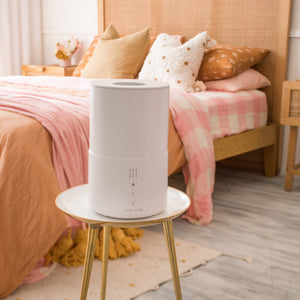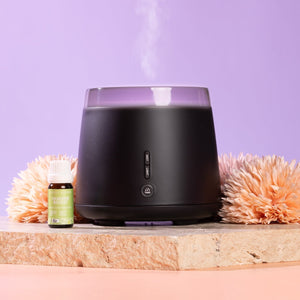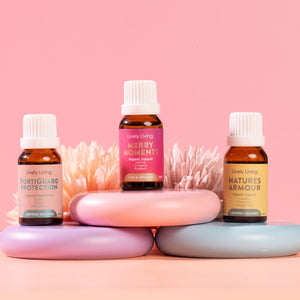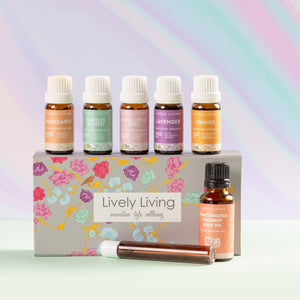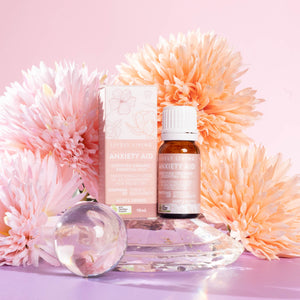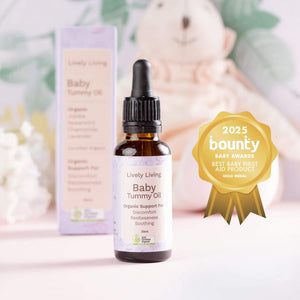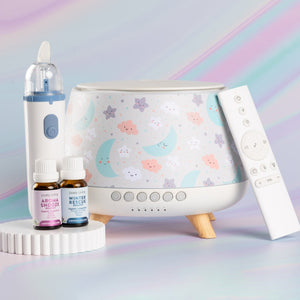Is A Nasal Aspirator Good for Babies?
So, your little one is all stuffed up, and you're wondering, is a nasal aspirator good for babies? As a parent, seeing your baby struggle to breathe is heart-wrenching. Tiny noses filled with mucus can disrupt sleep, feeding, and general happiness. You've probably heard about nasal aspirators, those little devices that suck the snot out of a baby's nose. But you might have some reservations—are they safe? Effective? Maybe even a bit icky?
Let's tackle those questions and figure out if a nasal aspirator is the right choice for you and your baby. Is a nasal aspirator good for babies? It might just become your new best friend during those sniffly days.
Table Of Contents:
- Understanding Baby Congestion
- Types of Nasal Aspirators
- How to Safely Use a Nasal Aspirator
- Are There Risks to Using a Nasal Aspirator?
- Beyond Nasal Aspirators: Other Remedies for Baby Congestion
- When to Seek Medical Attention
- Choosing the Right Nasal Aspirator
- FAQs about Nasal Aspirators for Babies
- Conclusion
Understanding Baby Congestion
Babies have small nasal passages, making them more susceptible to congestion. Unlike older kids and adults, they can't blow their noses, leading to discomfort and difficulty breathing. This can be particularly concerning for infants, as they are primarily 'nose breathers'.
Newborns are obligate nose breathers, meaning they breathe almost exclusively through their noses. This makes having a clear nose even more critical for them.
Why Clearing Nasal Congestion Is Important
Clearing a baby's stuffy nose isn't just about making them more comfortable. It helps them feed better and breathe easier. If a baby is congested, it can affect their ability to latch during breastfeeding or take a bottle properly.
Congestion can also interfere with their sleep and make them more fussy. A stuffy nose also raises the chances of ear infections and other respiratory complications. Clearing their nasal passage helps to reduce these risks and ensures your baby remains happy and healthy.
Types of Nasal Aspirators
Three main types of nasal aspirators are available, each with pros and cons.
Electric Nasal Aspirators
Electric nasal aspirators work similarly to oral suction but with battery-powered suction. This can be a convenient option. They obvisouly cost more than a manual bulb device, but definitely worth the investment. The #1 choice amongst Australian Families is the USB Rechareable Unit availalbe HERE
Some models have additional features like multiple suction levels and music to distract your little one. Consider these features when choosing the right aspirator for your baby's needs and preferences.
Bulb Syringes
These classic rubber bulbs are commonly found in baby care kits. You squeeze the bulb to create suction, then gently insert the tip into the baby's nostril to suck out the mucus.
While readily available and inexpensive, they can be tricky to clean thoroughly. This is why we always recommend reading product care guidelines. Nationwide Children's Hospital gives tips on effectively using bulb syringes to clear congestion.
Oral Suction Aspirators
This type uses a tube that you suck on to create suction. Many have disposable filters that prevent the snot from getting in your mouth. Some parents find this method a little squeamish, but many others actually prefer it over the bulb syringe.
Research shows parents like that these models are easy to control and clean. You can actually see how much mucus is being removed, giving you a visual confirmation of the aspirator's effectiveness.
How to Safely Use a Nasal Aspirator
No matter which type of nasal aspirator you choose, proper usage is crucial.
- Start with Saline Drops: To make suction more effective and gentler on your baby's delicate nasal passages, consider using saline drops or spray beforehand. The saline helps to soften the mucus, making it easier to remove. This can also reduce nasal dryness and irritation. The University of Michigan Medicine offers guidance on using saline nasal sprays .
- Position Your Baby Properly: Lay your baby on their back or gently recline them. Keep their head still as much as possible during suctioning.
- Insert the Tip Carefully: Never force the aspirator tip too far into the baby's nose. You only need to insert it a little bit into the nostril to create a seal for effective suctioning. If using a bulb syringe, squeeze out the air first, then gently insert the tip, and slowly release the bulb to suck out mucus. If using an oral suction aspirator, insert the tip into the baby's nostril, put the mouthpiece in your mouth, and gently suck to create the suction.
- Clean After Use: To avoid bacteria build-up, thoroughly clean the nasal aspirator according to the manufacturer's instructions. Most bulb syringes can be cleaned with soap and water, while oral and electric nasal aspirators may have parts that need to be disinfected. Pay attention to any information provided on how often to clean.
Are There Risks to Using a Nasal Aspirator?
Although generally safe, overusing a nasal aspirator can lead to nasal irritation and sometimes nosebleeds. Don't suction too frequently. Usually, before feeds and bedtime are sufficient.
Watch out for signs of irritation and consult your pediatrician if concerned. The University of Rochester Medical Center advises against overuse of nasal sprays and suction devices to prevent complications .
Beyond Nasal Aspirators: Other Remedies for Baby Congestion
So, is a nasal aspirator good for babies, even with those considerations? The answer is usually yes. When used properly, a nasal aspirator can offer great relief. Here are additional ways to ease your baby's discomfort and support healthy breathing:
- Humidifier: A cool-mist humidifier can help thin out mucus. Children's Hospital suggests trying saline drops with suctioning before bed, and a cool-mist humidifier for congestion .
- Elevated Head: Gently raise the head of your baby's crib mattress or bassinet by placing a rolled towel under it to help with drainage.
- Warm Bath: A warm bath can provide temporary relief by loosening mucus and calming the baby. Warm water can also help to soothe the baby's nasal passages and make them more comfortable. Rub some Balm into the Babys chest to help soothe and clear congestion further.
- Hydration: Encourage fluids, like breast milk or formula, to keep the baby well hydrated. Proper hydration helps to thin the mucus, making it easier for the baby to clear their nasal passages.
AROMA-SNOOZE PLUS 8 IN 1 HUMIDIFIER
When to Seek Medical Attention
While congestion is common in babies, sometimes a visit to the doctor is necessary. Look out for the following signs that might indicate a more serious issue:
- Fever over 38 degrees C for babies under 3 months old. Fever in young infants can be a sign of a serious infection.
- Difficulty breathing or rapid breathing. This could indicate a respiratory problem that needs immediate medical attention.
- Persistent cough. A cough that lasts for an extended period or worsens over time could be a symptom of an underlying condition.
- Refusal to eat or drink. Babies need to stay hydrated, especially when congested. Refusal to eat or drink can lead to dehydration.
- Lethargy or unusual fussiness. If your baby is unusually sleepy, difficult to wake, or excessively fussy, it's important to seek medical advice.
- Unusual nasal discharge, especially if it is thick, green, yellow, or bloody. This could be a sign of an infection.
If your baby shows any of these symptoms, consult your pediatrician to rule out any underlying infections or complications. Early intervention is key to ensuring your baby's health and well-being.
Shop Lively Living's Aroma-Snooze Plus Humidifier and Nasal Aspirator Sniffle Survival Bundle and SAVE HERE
Choosing the Right Nasal Aspirator
Now that we know the different kinds of nasal aspirators available and understand when and how to use them, how do you choose? Ultimately, the 'best' nasal aspirator is the one that works best for you and your baby. Some babies tolerate certain types better than others, so you may have to try a few before finding your favorite.
Consider your personal preferences and budget. Reading reviews and talk to your pediatrician, as they can offer tailored suggestions based on your baby's age, health history, and individual needs.
Did you know you can also try singing to your baby? Singing is a wonderful way to soothe and connect with your little one and has many benefits for babies .

FAQs about Nasal Aspirators for Babies
Is using a nasal aspirator safe for babies?
Yes, using a nasal aspirator is generally safe when used correctly. Follow instructions and avoid overusing it to prevent irritation or nosebleeds. When in doubt, talk to your pediatrician.
What are the disadvantages of a nasal aspirator?
While nasal aspirators can be very helpful, there are some disadvantages. Possible overuse could irritate the nose, and some babies resist having it done. Certain types can be tricky to clean completely.
These are temporary issues compared to the potential harm caused by unmanaged congestion in newborns, especially because they primarily breathe through their noses in those first few months of life.
Can I use a nasal aspirator when my baby is sleeping?
Generally, it's not a good idea to suction your baby's nose while they are sleeping. This could startle them or disrupt their sleep.
It is easier when they are awake and you can comfort them during the process. The goal is to clear their nasal passages to help them breathe better, feed easily, and sleep comfortably, so waking them to do so sort of defeats the purpose.
How often should a baby use a nasal aspirator?
The frequency of use depends on the severity of the congestion. Usually, before feeding and bedtime are good times to help clear their nose for comfortable breathing.
Overuse can irritate their delicate nasal passages, so moderation is key. Always follow your pediatrician's advice if unsure about the appropriate frequency.
Conclusion
Ultimately, when it comes to the question 'is a nasal aspirator good for babies?' the answer is a nuanced yes. Used correctly, these devices offer relief, support breathing, and may help to prevent complications like ear infections. However, avoid overuse to prevent irritation.
You know your baby best, and together, you can navigate those stuffy nose moments to bring them much-needed relief.















